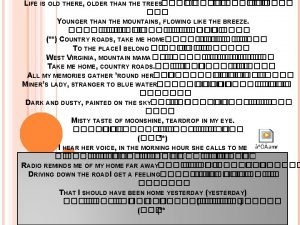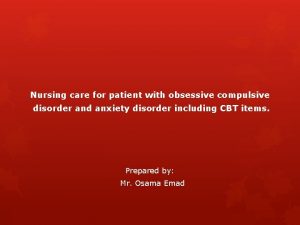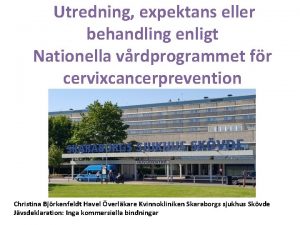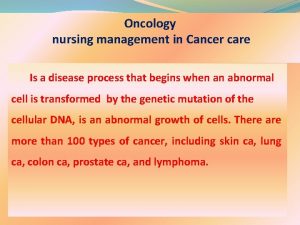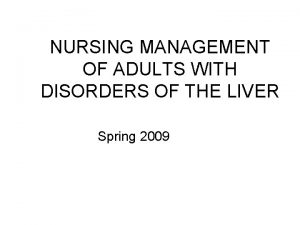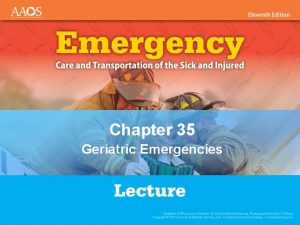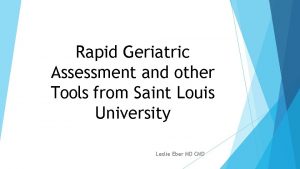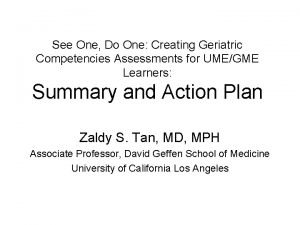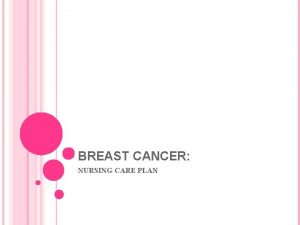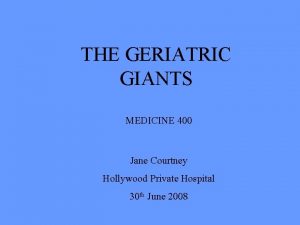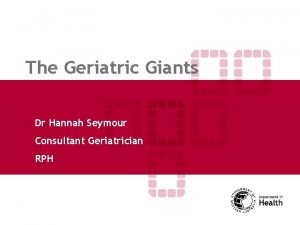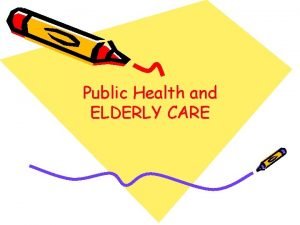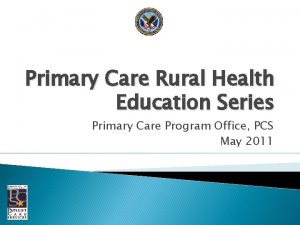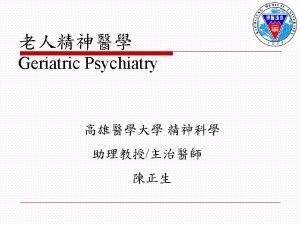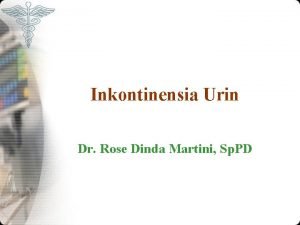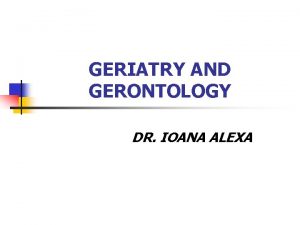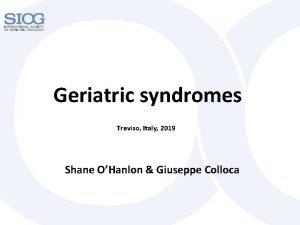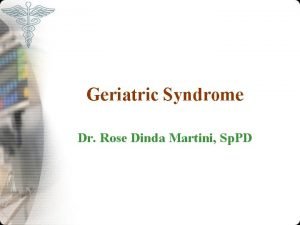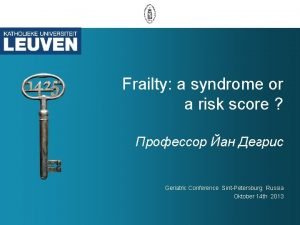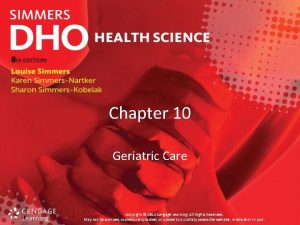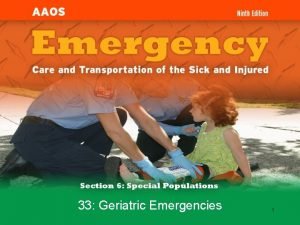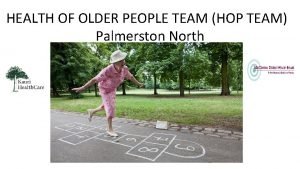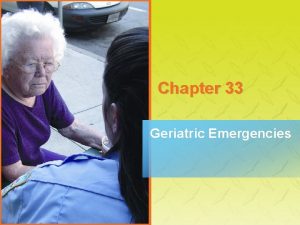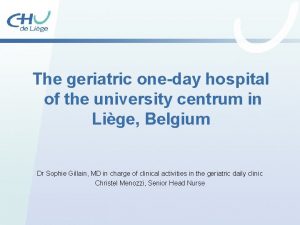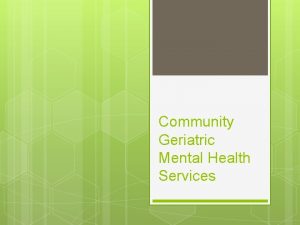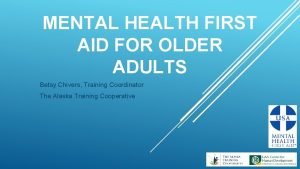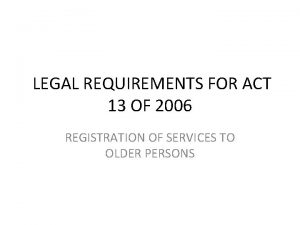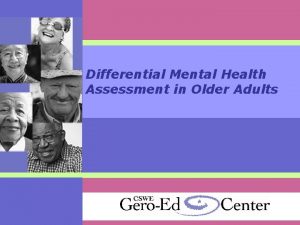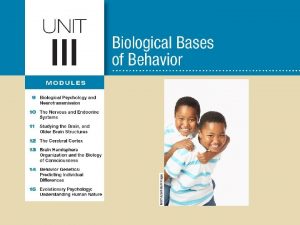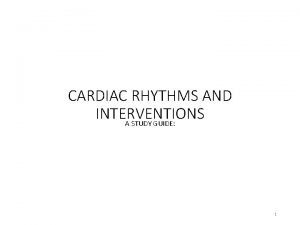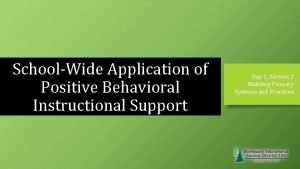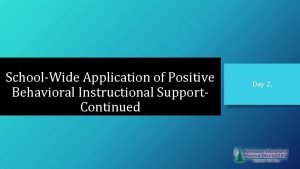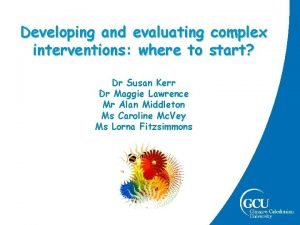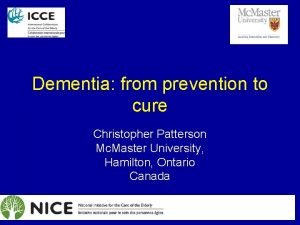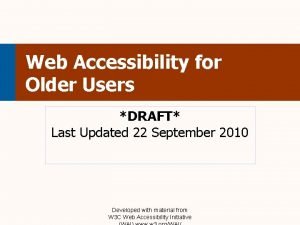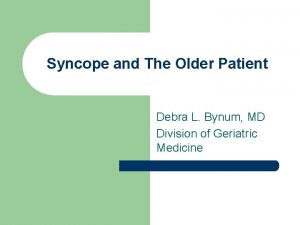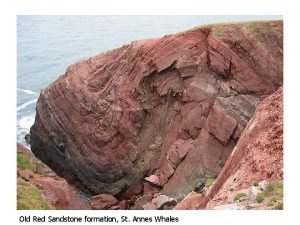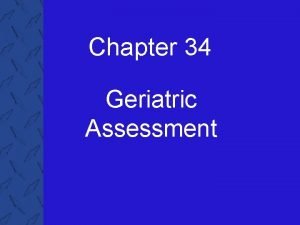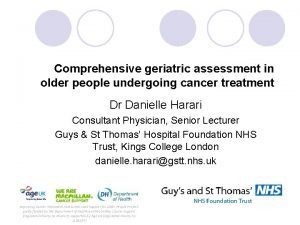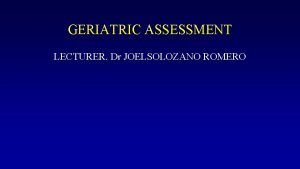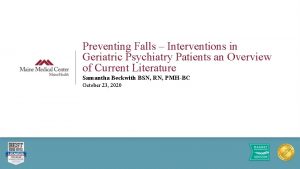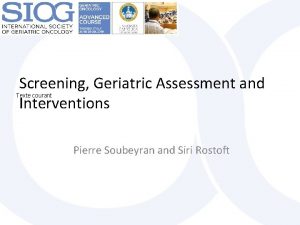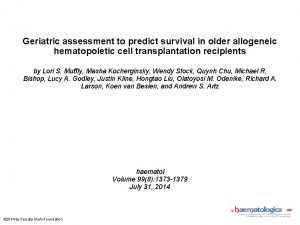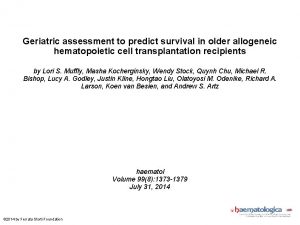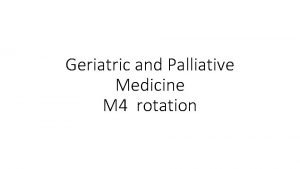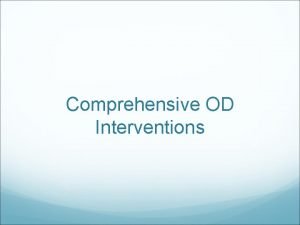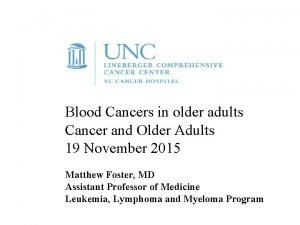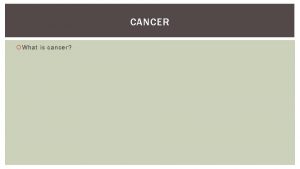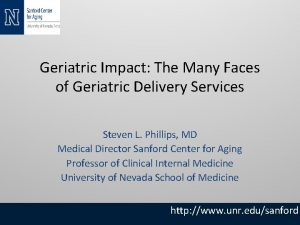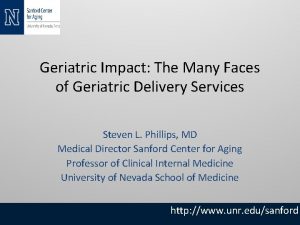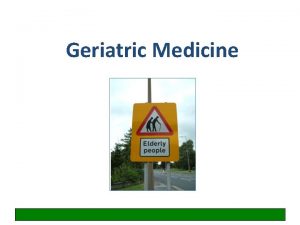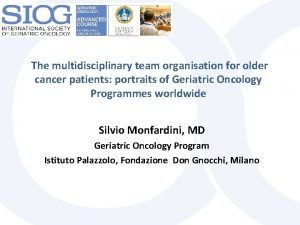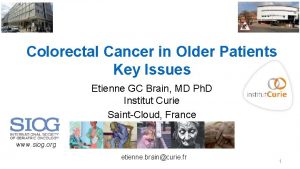Geriatric Assessment and Interventions for Older Cancer Patients











































- Slides: 43

Geriatric Assessment and Interventions for Older Cancer Patients: Past, Present, Future Harvey Jay Cohen, MD U 13 Conference May 13, 2015 1

GEM Early Stirrings • Models of Geriatric Care in UK in 30’s-40’s • US awareness – 1970’s; elderly complex, multifaceted issues • Many issues not uncovered in routine evaluation - Kanes’ book – 1981 • Hospitalized older patients at risk for Functional Decline



ASSESSMENT OF THE ELDERLY PATIENT • • Medical Cognitive Affective Functional - Physical - Social • • Economic Social support/caregiver Environmental Quality of life/well-being

GOALS OF GERIATRIC ASSESSMENT • • • Improve Diagnostic Accuracy Guide Selection of Interventions Recommend optimal environment Predict outcomes Monitor clinical changes






GEM Trial Results 1. GEMU pts better at Discharge in: SF 36 – Physical Functioning Bodily Pain – also at 1 year Energy/Fatigue General Health Basic ADL PPT 2. GEMC better at 1 year in: energy, general health SF 36 mental health 3. No difference in mortality at DC or 1 year Cohen et al NEJM 346: 905, 2002



CGA Patients • More likely alive and at home 1. 16 (1. 05 -1. 28) p=. 003 • Less likely in residential care 0. 78 (. 69 -. 88) p= <. 001 • Less likely to experience deterioration 0. 76 (. 68 -. 90) p=. 001 Ellis G. et al, BMJ 343: 1 -10, 2011

CGA Across the Spectrum • Outpatient – Home: Improve function; mortality – Clinic-based: Improve function; QOL – Community care: Reduced admissions; Readmissions • Inpatient: – Geri Consultation – Acute Care of the Elderly (ACE) – GEMU The Challenge The Approach Results A Way Forward

Comprehensive Geriatric Assessment (CGA) • Multidimensional, interdisciplinary, interprofessional • Diagnostic process • Comprehensive Account for social and environmental circumstances – Medical – Psychological – Functional • Patient centered plan that is used to optimize not just predict or assess • To develop a coordinated and integrated plan for treatment and long-term follow up The Challenge The Approach Results A Way Forward

COMPREHENSIVE GERIATRIC ASSESSMENT FOR OLDER CANCER PATIENTS • Bernabei (2000) – proposed “minimal data set” – extensive • Balducci (1998) – applied principles in outpatient setting • Ingram (2002) – utilized self report pre-visit data collection for outpatient setting • Repetto (2002) – CGA added information to performance status in inpatient setting • Hurria (2005) – combination self report and performance based

GERIATRIC ASSESSMENT FOR ELDERLY CANCER PATIENTS Goals • Prediction of outcomes, e. g. toxicity • Patient selection • Management during treatment – Comorbidities – Medications • Survivorship management Freyer, Ann Oncol 16: 1795, 2005 Hurria, Oncology 21: 351, 2007 Basso, Crit Rev Onc/Hem 66: 163, 2008 Girre, JGMS 63 A: 724, 2008


EFFECT OF GEM ON SF-36 In Elderly Cancer Patients SF-36 scale Emotional Limitation Bodily Pain Mental Health UCIP Mean n = 55 2. 04 P value D/C GEMU Mean n = 44 30. 02 UCOP Mean n = 56 9. 99 P value 0. 01 GEMC Mean n = 53 18. 64 6 M 38. 69 - 0. 12 0. 001 21. 01 13. 62 0. 56 12 M 41. 88 15. 50 0. 08 26. 53 32. 21 0. 71 D/C 28. 30 10. 41 0. 009 21. 40 15. 05 0. 36 6 M 31. 16 2. 76 0. 003 19. 62 11. 39 0. 40 12 M 37. 83 9. 65 0. 006 24. 99 23. 39 0. 88 D/C 5. 59 - 6. 55 0. 01 3. 73 - 6. 74 0. 03 6 M 11. 86 - 7. 58 0. 006 - 1. 04 9. 43 0. 15 12 M 9. 89 -3. 07 0. 11 5. 75 1. 20 0. 58 0. 44 Rao, JGMS, 60 A: 798, 2005

CONCLUSIONS • Impressive and sustained effect on bodily pain • Positive effect on emotional limitations and mental health parameters • No effect of GEMU on overall survival and mortality • No difference in costs between GEMU and usual care of cancer patients Rao, JGMS, 60 A: 798, 2005

CGA-CA: OTHER APPROACHES • Clinical Interview – Monfardini S et al, Cancer 77: 395 -401, 1996 Takes 27 minutes provider time • Mailed in Questionnaire – Ingram S et al, J Clin Oncol 20: 770 -775, 2002 Takes about 40 minutes patient time • Self Administered Questionnaire – Hurria et al, Cancer 104: 1998 -2005, 2005 Takes 27 minutes, including 3 -4 minutes provider time

GERIATRIC ASSESSMENT MEASURES SELECTED BASED ON RELIABILITY, VALIDITY, BREVITY AND PROGNOSTIC VALUE Domain Measures ______________________________ Functional Status ADL of MOS Physical Health Scale IADL {Subscale of the OARS} Karnofsky Performance Status {Physician-Rated} Karnofsky Performance Status {Patient-Rated} Timed Up and Go Number of Falls in Last 6 Months Comorbidity Physical Health Section {Subscale of the OARS} Cognition Blessed Orientation-Memory-Concentration Test Psychological Hospital Anxiety and Depression Scale Social Functioning MOS Social Activity Limitations Measure Social Support MOS Social Support Survey: Emotional/Information and Tangible Subscales Seeman and Berkman Social Ties Nutrition Body Mass Index % Unintentional Weight Loss in Last 6 Months Medications List Prescribed, Herbal, OTC Hurria, Crit Rev Onc/Hem 59: 211, 2006

J Clin Oncol 29: 1290 -1296, 2011 Criteria Median time: < 40 minutes Result 22 minutes Complete w/out assist: > 70% 88% Complete Blessed OMC, KPS, Timed Up and Go: > 80% 95% Difficult to understand: < 20% 5% Satisfied with length 92% No Upsetting questions 95%

H. Klepin, Blood 121: 4287, 2003

Model Performance: Prevalence of Toxicity by Score High (83%) 89% Grade 3 -5 Toxicities 100% Medium (52%) 80% Low (30%) 60% 50% 77% 54% 40% 25% 32% 0% 0 -3 4 -5 6 -7 8 -9 Total Risk Score 10 -11 12 -19 Hurria, JCO 29: 3457 -3465, 2011

% Risk CRASH Model Score Extermann, Cancer 118: 3377 -3386, 2012

Blood. 125: 2068 -74, 2015

Geriatric Assessment Screening Tools • • a. CGA Barber Questionnaire Fried Frailty Criteria Geriatric 8 (G 8) Groningen Frailty Index Triage Risk Screening Test (TRST) Vulnerable Elders Survey (VES 13) Lacks Screening Test NCCN Guidelines V 1 2014 Senior Adult Oncology www. nccn. org

GERIATRIC ASSESSMENT FOR ELDERLY CANCER PATIENTS Goals • Prediction of outcomes, e. g. toxicity • Patient selection • Management during treatment – Comorbidities – Medications • Survivorship management Freyer, Ann Oncol 16: 1795, 2005 Hurria, Oncology 21: 351, 2007 Basso, Crit Rev Onc/Hem 66: 163, 2008 Girre, JGMS 63 A: 724, 2008

An Update On A Systematic Review Of The Use Of Geriatric Assessment For Older Adults In Oncology M. T. E. Puts, B. Santos, J. Hardt, J. Monette, V. Girre, E. G. Atenafu, E. Springall and S. M. H. Alibhai Ann Oncol. 25: 307 -15. 2014

Relevance of a Systematic Geriatric Screening and Assessment in Older Patients with Cancer: Results of a Prospective Multicentric Study C. Kenis, et al; Ann Oncol 24: 1306, 2013 • 1967 Cancer Patients ≥ 70 years of age • G 8 abnormal in 70% Comprehensive Geriatric Assessment (CGA) • Unknown geriatric problems – 51% ( function, nutrition fatigue, falls, depression, pain most common) • Interventions planned -26% (nutrition, depression fatigue, function most common) • Assessment influenced treatment decision – 25%

What Next? • Enhance the Assessment • CGA to Guide Interventions • Survivorship Management

Characterization of the Older Cancer Patient • Standard History and Physical Exam • Comprehensive Geriatric Assessment • Tumor Characterization - Histology - Genetics • Host Biology - Fluid Biomarkers - Cellular Biomarkers

Association of Markers and Function † Analyses were controlled for age, sex, race, education, body mass index, cognitive status, deep depression, self-rated health, cancer, heart attack, stroke, diabetes, hypertension, sleep difficulties, smoking and alcohol use. Huffman, J Gerontol 66: 1373, 2012

Weighted correlations between circulating biomarkers and physical performance Circulating Number of N Weighted Fisher’s Z Q Statistic Biomarker Studies Subjects Correlation IL-6 TNFR-2 D-Dimer TNFR-1 GCSF TNFa VCAM 6 5 5 5 4 6 4 603 562 309 603 469 -0. 22 -0. 19 -0. 15 -0. 14 -0. 09 -5. 39* -4. 39* -3. 55* -3. 47* -2. 36* -2. 27* -1. 97* 9. 27 0. 31 6. 76 2. 85 3. 61 5. 78 3. 25 *Adjusted p<0. 05 (adjusted for age, BMI, gender, and race). M. Peterson, J Gerontol A Biol Sci Med Sci. 2015

Summary of Proposed Markers of Functional Age Marker Source Test Association with Frailty / function Association with mortality Chronic inflammatory markers Serum or plasma ELISA Yes (CRP, IL-6, TNFα, D-dimer, IL 1 RA Yes (CRP, IL-6, Ddimer, s-VCAM) Telomere length Leukocyte DNA Q-PCR or southern blot Yes P 16 INK 4 a T lymphocyte RNA RT-q. PCR No No CT scan Commercially available software for body composition analysis Yes Sarcopenia Hubbard, Muss, Cohen. JCO, 32: 2611, 2014

Proposed Study Schema Does access to GA data lead to better decision-making and improve outcomes? Treatment without GA Knowledge Arm: « Usual Care » MD allowed to choose dose & regimen (single/ doublet) NSCLC Stage IV Age > 70 years ECOG PS 2 Geriatric Assessment PRO/ Qo. L Physical Function Pt Expectations* Strat factors: • • • Histology Gender Age > 80 R A N D O M Pem +/- Carbo (non-sq) Gem+/- Carbo (sq) *Paclitaxel +/- carbo (Randomization by site)* GA knowledge Arm MD provided GA/ Tox score results & Implications/ risks MD allowed to choose dose & regimen (single/ doublet) Primary End Point: OTU* Secondary: Global Qo. L Toxicity Physical Function OS, PFS, ORR Pem +/- Carbo Gem+/- Carbo Paclitaxel+/- Carrbo * These areas need further discussion

SURVIVORSHIP MANAGEMENT Problem: • Oncologists do a good job of cancer related management – not so good at comorbidities and functional status • Primary care providers do good job of comorbidites and functional status – not so good at cancer related Earle, Cancer, 101: 1712, 2004 Mao, JCO 27: 933, 2009 • Current care plans concentrate on cancer related issues for the primary care provider

SURVIVORSHIP MANAGEMENT (cont. ) Potential Answers: • Share care, clear communications • Geriatric specific “Survivorship Care Plan” for both oncologists and primary care providers • Oncology providers can use Geriatric Assessment screening to indicate need for further evaluation, e. g. brief CGA


 Life is older older than the trees
Life is older older than the trees Obsessive compulsive disorder nursing diagnosis
Obsessive compulsive disorder nursing diagnosis Ventriculostomy care nursing
Ventriculostomy care nursing Aktiv exspektans
Aktiv exspektans Testicular cancer nursing diagnosis
Testicular cancer nursing diagnosis Nursing management of liver abscess
Nursing management of liver abscess Gems diamond geriatric
Gems diamond geriatric Sarc-f
Sarc-f Geriatric competency assessment
Geriatric competency assessment Taller and younger older and shorter
Taller and younger older and shorter Nursing assessment of breast cancer
Nursing assessment of breast cancer Geriatric giants
Geriatric giants Giant of geriatric
Giant of geriatric Geriatric syndrome
Geriatric syndrome Objectives of geriatric care
Objectives of geriatric care Va geriatric scholars program
Va geriatric scholars program Geriatric psychiatry definition
Geriatric psychiatry definition Geriatric giant
Geriatric giant Geriatric giants
Geriatric giants What is geriatric syndromes
What is geriatric syndromes 14i geriatric giants
14i geriatric giants Geriatric syndrome
Geriatric syndrome Chapter 10:3 psychosocial changes of aging
Chapter 10:3 psychosocial changes of aging Gems assessment
Gems assessment Supportlinks palmerston north
Supportlinks palmerston north Gems diamond geriatric
Gems diamond geriatric Centrum geriatric
Centrum geriatric Geriatric hat trick
Geriatric hat trick Community geriatric psychiatry
Community geriatric psychiatry Geriatric case presentation
Geriatric case presentation Geriatric nutrition
Geriatric nutrition Mental health and older adults
Mental health and older adults Dq98 assessment form
Dq98 assessment form Mental health and older adults
Mental health and older adults Downsizing and divesting older business
Downsizing and divesting older business Module 11 studying the brain
Module 11 studying the brain Jones and bartlett 2012 ekg strips
Jones and bartlett 2012 ekg strips Positive behavioral interventions and supports
Positive behavioral interventions and supports Positive behavioral interventions and supports
Positive behavioral interventions and supports Developing and evaluating complex interventions
Developing and evaluating complex interventions Dementia treatments and interventions near patterson
Dementia treatments and interventions near patterson Web accessibility for older users
Web accessibility for older users Syncope in the older patient is
Syncope in the older patient is Synformal anticline
Synformal anticline
